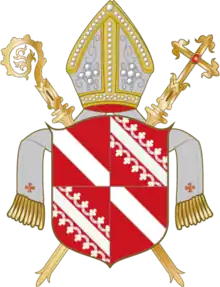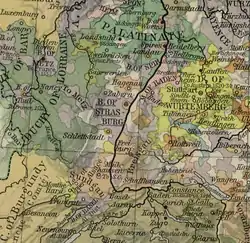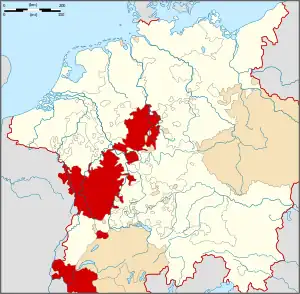Prince-Bishopric of Strasbourg
The Prince-Bishopric of Strasburg (German: Fürstbistum Straßburg; Alsatian: Fìrschtbischofsìtz Strossburi(g)) was an ecclesiastical principality of the Holy Roman Empire from the 13th century until 1803. During the late 17th century, most of its territory was annexed by France; this consisted of the areas on the left bank of the Rhine, around the towns of Saverne, Molsheim, Benfeld, Dachstein, Dambach, Dossenheim-Kochersberg, Erstein, Kästenbolz, Rhinau, and the Mundat (consisting of Rouffach, Soultz, and Eguisheim). The annexations were recognized by the Holy Roman Empire in the Treaty of Ryswick of 1697. Only the part of the state that was to the east of the Rhine remained; it consisted of areas around the towns of Oberkirch, Ettenheim, and Oppenau. This territory was secularized to Baden in 1803.
Prince-Bishopric of Strasbourg | |||||||||||
|---|---|---|---|---|---|---|---|---|---|---|---|
| 982–1803 | |||||||||||
.svg.png.webp) Flag
 Coat of arms
| |||||||||||
 The Prince-Bishopric of Strasbourg, circa 1547 | |||||||||||
| Status | Prince-Bishopric | ||||||||||
| Capital | Straßburg | ||||||||||
| Common languages | Alsatian | ||||||||||
| Government | Prince-Bishopric | ||||||||||
| Historical era | Middle Ages | ||||||||||
• Prince-Bishopric founded | before 343 | ||||||||||
• Gained autonomy | 775 982 | ||||||||||
| 982 | |||||||||||
1681 | |||||||||||
1697 | |||||||||||
| 1803 | |||||||||||
| |||||||||||
| Today part of | |||||||||||
| Part of a series on |
| Alsace |
|---|
|
|
See also
Notes
References
- Herbermann, Charles, ed. (1913). . Catholic Encyclopedia. New York: Robert Appleton Company.

.svg.png.webp)

.svg.png.webp)